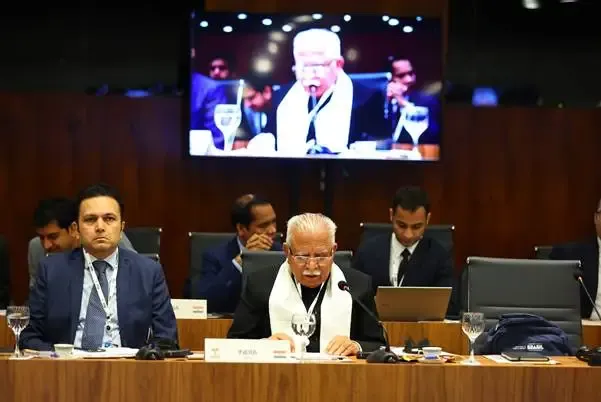Is India Committed to Building a Sustainable, Inclusive Energy Future?

Synopsis
Key Takeaways
- Energy Security is a top priority for India.
- India's electricity capacity is set to reach 900 GW by 2032.
- The nation is a leading producer of solar and wind energy.
- Investment in biofuels and green hydrogen is accelerating.
- India is fostering cooperation through the Global Biofuels Alliance.
New Delhi, May 20 (NationPress) India has identified energy security as one of the most urgent challenges today, stressing the necessity to enhance BRICS cooperation to ensure economic stability and sustainability, in addition to fostering equitable access to energy resources worldwide, the government announced on Tuesday.
During the BRICS Energy Ministers’ Meeting held in Brasília, Union Minister for Power and Housing and Urban Affairs, Manohar Lal, reiterated India’s steadfast commitment to establishing a sustainable and inclusive energy future, commending Brazil’s leadership under the theme, 'Strengthening Global South Cooperation for More Inclusive and Sustainable Governance.'
He further underscored the essential nature of energy security, access, and affordability in propelling global development objectives.
Manohar Lal also highlighted India’s swift advancements in clean energy, reporting a 90 percent increase in electricity capacity over the past decade, reaching 475 GW by 2025, with a goal of 900 GW by 2032, thus becoming the world’s third-largest producer of solar and wind energy.
India is swiftly progressing towards its Nationally Determined Contributions (NDCs), achieving a 20 percent ethanol blending milestone and thereby promoting biofuel adoption and reducing emissions.
The nation is investing in smart grids, advanced metering infrastructures, and an expanded transmission network, which includes the Green Energy Corridor, as informed by the minister.
India has ambitious targets for green hydrogen and nuclear energy, including a target of 100 GW of nuclear capacity by 2047.
Manohar Lal emphasized the significance of the Global Biofuels Alliance in enhancing collaboration within the biofuels sector and reaffirmed India’s commitment to energy efficiency through innovative initiatives like the Energy Conservation Sustainable Buildings Code, rooftop solar programs, and efficient appliance standards.
He stressed the crucial role of fossil fuels in the global energy mix—particularly for developing nations—and called for enhanced cooperation to promote their cleaner and more efficient use through technologies such as coal gasification, carbon capture and storage, and green chemical innovations.
Manohar Lal invited the BRICS nations to join the upcoming BRICS energy meeting scheduled for 2026 in India, reaffirming the country’s dedication to leading the energy agenda for the Global South.









